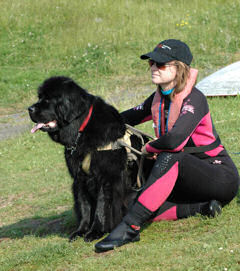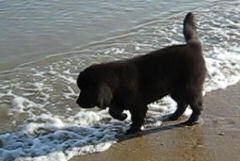Why we train
The Newfoundland's natural swimming ability, size and stamina make it the ideal water rescue dog. To ensure these natural assets are preserved, promoted and enjoyed to the full, structured training is invaluable. This is best achieved by belonging to a working group, such as Grangewaters, that has experienced members who can ensure you and your dog train in a safe environment with the emphasis being on fun.
Our training methods
We don't have a prescribed formula for training, the emphasis is put on encouraging the dogs at all times and on praising and rewarding their co-operation and achievements. We never force a dog by physical means or intimidation to carry out an exercise. It may be called 'work' but it is always made FUN for the dogs and owners.
 It is usual for us to work one dog at a time, the rest being staked well away from the water. This avoids the dog being worked getting distracted by the presence of another dog close by.
There are occasions when more than one dog in or near the water is beneficial. For instance, when a novice dog is reluctant to enter the water. The presence of another dog in the water can be all the novice needs to overcome their fear. It is fascinating to see a newfie on the bank carefully observing another newfie working in the water ... you can almost see the wheels going around as they figure out what is going on.
It is usual for us to work one dog at a time, the rest being staked well away from the water. This avoids the dog being worked getting distracted by the presence of another dog close by.
There are occasions when more than one dog in or near the water is beneficial. For instance, when a novice dog is reluctant to enter the water. The presence of another dog in the water can be all the novice needs to overcome their fear. It is fascinating to see a newfie on the bank carefully observing another newfie working in the water ... you can almost see the wheels going around as they figure out what is going on.
Getting started
 Most Newfoundland owners who take 'the plunge' for the first time with their dogs are soon smitten by the experience. Each dog differs in his initial reaction to the water and it's a common misconception that all Newfoundlands instantly dive in.
However, most newcomers generally take to it quickly and it is great to see a Newfoundland discovering it's abilities. From thereon, progress largely depends on the owners desire and commitment to involve themselves in the training, not only of their own dog, but to assist with the training of the more experienced dogs within the group, as in this way the novice owner learns training techniques that will be of benefit to them and their dog.
Most Newfoundland owners who take 'the plunge' for the first time with their dogs are soon smitten by the experience. Each dog differs in his initial reaction to the water and it's a common misconception that all Newfoundlands instantly dive in.
However, most newcomers generally take to it quickly and it is great to see a Newfoundland discovering it's abilities. From thereon, progress largely depends on the owners desire and commitment to involve themselves in the training, not only of their own dog, but to assist with the training of the more experienced dogs within the group, as in this way the novice owner learns training techniques that will be of benefit to them and their dog.
Training for tests
The majority of exercises used to train our Newfoundlands are those that form the official Water Tests operated by the three UK Newfoundland Clubs. Water Tests are held up and down the country, hosted by various working groups. Take a look at our separate page about Water Tests.
The formal test exercises are far from a complete list of what you can train your dog to achieve and some owners choose not to train specifically for tests, but to practice other exercises that they or their group devise. It doesn't matter if you don't want to enter tests, training is still fun and you are just as welcome with Grangewaters Working Newfoundlands.
Equipment
You will need the following items
- Wet or dry suit
- Boots
- Life jacket or bouyancy aid
- A bouyancy aid for your dog
- Stake and tether or a means of safely securing your dog
- A means to shade your dog on warm days
- Water and bowl
- Reward treats or toys
- Poo bags to clean up after your dog